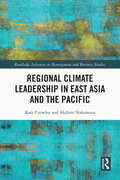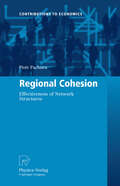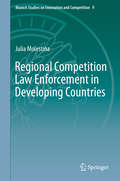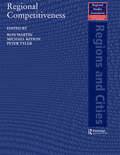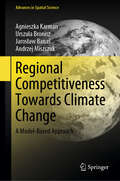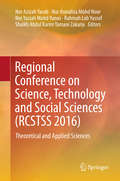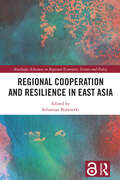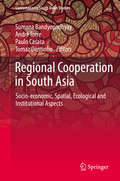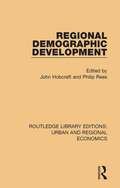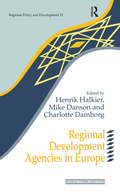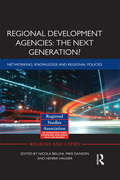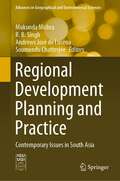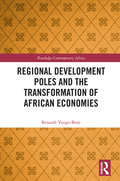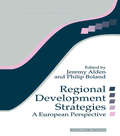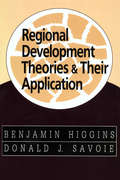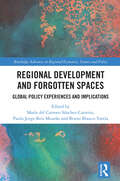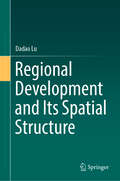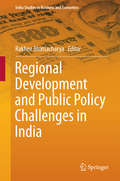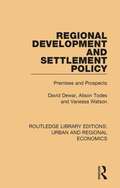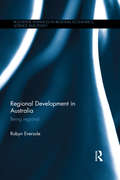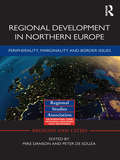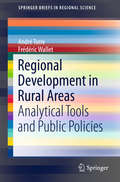- Table View
- List View
Regional Climate Leadership in East Asia and the Pacific (Routledge Advances in Management and Business Studies)
by Kate Crowley Akihiro NakamuraThis book defines regional climate leadership in East Asia and the Pacific as a novel addition to the climate leadership theory. It develops criteria for measuring such leadership on a country basis and uses these for assessing the efforts of developed, lesser-developed, and developing countries within these regions.The book suggests that regional climate leadership consists of leading domestic actions, leading actions within the region, leading actions that are regionally coordinated, and leading actions on a differentiated basis between countries with greater and lesser capacity, and with neighbourly intent. The book is policy and climate solutions-focused, and identifies opportunities for lesson learning and policy transfer for more effective mitigation and adaptation. These solutions take into account the widely varying and complex geographical, political, and institutional circumstances of the region.It is intended for a broad readership of climate policy actors, including policy professionals, academics, non-government researchers, and all who are looking for climate leadership solutions to the problems of accelerating climate impact in East Asia and the Pacific.
Regional Cohesion
by Piotr PachuraThis book presents an interdisciplinary analysis of EU regional cohesion based on a network and clusters approach. The author explores the question if and how the presence of network structures supports the effectiveness of transformation in EU regions, in particular with a focus on non-pecuniary factors of regional growth. For a theoretical foundation of the topic, characteristics of a networking economy as well as the determinants of EU policies on regional development and innovation are examined and discussed. The empirical analysis at the core of this work presents and makes use of interdisciplinary methodological tools such as Data Envelopment Analysis (DEA), K-means models and self-organizing maps.
Regional Cohesion: Effectiveness of Network Structures (Contributions to Economics)
by Piotr PachuraThis book presents an interdisciplinary analysis of EU regional cohesion based on a network and clusters approach. The author explores the question if and how the presence of network structures supports the effectiveness of transformation in EU regions, in particular with a focus on non-pecuniary factors of regional growth. For a theoretical foundation of the topic, characteristics of a networking economy as well as the determinants of EU policies on regional development and innovation are examined and discussed. The empirical analysis at the core of this work presents and makes use of interdisciplinary methodological tools such as Data Envelopment Analysis (DEA), K-means models and self-organizing maps.
Regional Competition Law Enforcement in Developing Countries (Munich Studies on Innovation and Competition #9)
by Julia MolestinaThe book examines the potential for regional competition law systems as enforcement tools in developing countries, based on a case study of the West African Economic and Monetary Union, the Andean Community and the Caribbean Community.It analyses the allocation of enforcement competences between the regional/supranational and the national level and formulates detailed guidelines on the optimal degree of centralization or decentralization. The book addresses all readers that are interested in the enforcement of competition law in developing countries. Moreover, it provides practical insights for public institutions that wish to identify or prevent possible misallocation of competences within regional competition law systems.
Regional Competitiveness (Regions and Cities #30)
by Ron Martin Peter Tyler Michael KitsonThere is now a wide spread interest in regions as a key focus in the organization and governance of economic growth and wealth creation. This important book considers the factors that influence and shape the competitive performance of regions. This is not just an issue of academic interest and debate, but also of increasing policy deliberation and action. However, as the readings in this book make clear, the very idea of regional competitiveness is itself complex and contentious. Many academics and policy makers have used the concept without fully considering what is meant by the term and how it can be measured. Policy formulation has tended to rush ahead of understanding and analysis, and the purpose of this book is to close this important gap in understanding. This book was previously published as a special issue of Regional Studies.
Regional Competitiveness Towards Climate Change: A Model-Based Approach (Advances in Spatial Science)
by Andrzej Miszczuk Agnieszka Karman Urszula Bronisz Jarosław BanaśThis book analyzes the competitiveness of European regions and presents forecasts for 2030 and 2100 under different climate scenarios. It examines the economic impact of climate change from a regional economic perspective and sheds light on various factors that influence regional competitiveness and development. Furthermore, the authors derive reflections on EU climate policy and policy recommendations from the empirical results, which will help both scientists and regional decision-makers to implement policy measures and develop successful adaptation processes for the regions and countries of the EU to climate change.
Regional Conference on Science, Technology and Social Sciences: Theoretical And Applied Sciences (RCSTSS #2016)
by Nor Azizah Yacob Nur Asmaliza Mohd Noor Nor Yuziah Mohd Yunus Rahmah Lob Yussof Shaikh Abdul Karim Yamani ZakariaThis book gathers selected theoretical and applied science papers presented at the 2016 Regional Conference of Sciences, Technology and Social Sciences (RCSTSS 2016), organized biannually by the Universiti Teknologi MARA Pahang, Malaysia. Addressing a broad range of topics, including architecture, computer science, engineering, environmental and management, furniture, forestry, health and medicine, material science, mathematics, plantation and agrotechnology, sports science and statistics, the book serves as an essential platform for disseminating research findings, and inspires positive innovations in the region’s development.The carefully reviewed papers in this volume present work by researchers of local, regional and global prominence. Taken together, they offer a valuable reference guide and point of departure for all academics and students who want to pursue further research in their respective fields.
Regional Cooperation and Resilience in East Asia (Routledge Advances in Regional Economics, Science and Policy)
by Sebastian BobowskiThis book argues that a resilient region should act reactively and proactively in the face of shocks and disruptions and asserts that the institutionalization of regional cooperation may be the answer to development challenges in times of uncertainty and instability.It considers regional, transregional, and subregional cooperation initiatives for building regional resilience and critically examines a broad spectrum of issues, such as international security and trade, economic development, value chains in production, and social welfare. Adopting the concept of resilience allows for a holistic, dynamic, and systematic approach to the studies on the regional process of institutionalization, responsiveness, and adaptability to challenging circumstances. The economic and social indicators of the countries in the region are examined alongside an analysis of the regional institutional architecture.The reader is acquainted with the essence of resilience concerning each category of challenges and the mechanisms of its achievement and strengthening through regional integration. The interdisciplinary character of the book makes it suitable for usage not only by economists but also by lawyers. As such, the book will be helpful to scholars and students of international economics, international security, and policymakers.
Regional Cooperation in South Asia
by André Torre Paulo Casaca Sumana Bandyopadhyay Tomaz DentinhoThis book highlights various challenges and opportunities for regional cooperation and development in South Asia. In light of the ongoing globalization process, the contributors investigate how socio-economic developments are changing the spatial organization of production as well as the profile of cities and landscapes, are stimulating the creation of maritime, terrestrial and aerial channels, and are putting increasing pressures on natural and environmental resources. The book is divided into four parts: The first part analyses the increasing intensity of regional trade, migration and investment flows; the second focuses on channels and adapted spaces. The third part addresses sustainability and natural resources, while the fourth highlights institutional issues.
Regional Cultures and Mortality in America
by Stephen J. Kunitz Ning Zhang"Across the contiguous 48 states, populations in states with more activist civic cultures have lower mortality than states that do not follow this model. Several different factors can be pointed to as causes for this discrepancy - net income, class inequality, and the history of settlement in each of the different states and regions. These observations are true of Non-Hispanic Whites and African Americans but not of American Indians, and Hispanics, neither of which is fully integrated into the state political culture and economy in which it resides. In Regional Cultures and Mortality in America, the struggles these various populations face in regard to their health are explored in terms of where they reside"--Provided by publisher.
Regional Demographic Development (Routledge Library Editions: Urban and Regional Economics #8)
by John Hobcraft Philip ReesOriginally published in 1979. This volume brings together the work of distinguished demographers, geographers, statisticians and policy-makers who look in detail at various mechanisms by which regional population structures develop. The introduction deals with a synthesis of the area covered in the book and this is followed by the four major sections of population history, fertility, migration and population projections. The book provides the reader with a comprehensive and unique picture of regional populations and demographic development viewed from a variety of temporal and methodological perspectives, and will be of considerable value to all those connected with population studies and regional studies.
Regional Development Agencies in Europe (Regions and Cities #Vol. 21)
by Henrik Halkier Mike Danson Charlotte DamborgIn the past decade Europe has seen much change, and at the same time the importance of the regional perspectives has significantly increased. Regional Development Agencies in Europe brings together experiences of Regional and Development Agencies throughout Europe to provide material for the first major comparative study of bottom-up regional policy across the continent. Using an analytical framework developed by editors, the contributors evaluate the long term potential and limitations of the RDAs in terms of promoting regional and economic development. Institutional and other preconditions for successful regional polices are identified, and combined with a broad analytical and geographical coverage that includes Eastern Europe, a clearer picture of the relevance of the RDAs emerges.
Regional Development Agencies: Networking, Knowledge and Regional Policies (Regions and Cities #59)
by Nicola Bellini Henrik Halkier Mike DansonAcross Europe, regional development agencies (RDAs) have become a central feature of regional policy, both as innovative policy-makers and as the implementers of programmes and initiatives originating from the national or European level. By drawing on a combination of conceptual reflection, surveys, comparative research, and systematic use of critical case studies, this book provides a new point of reference by identifying key features of the current, and, indeed next, generation of regionally-based economic development organisations.
Regional Development Banks in Comparison
by Ruth Ben-ArtziIn a study that contributes to IR and IPE theory, Ruth Ben-Artzi raises substantive issues relating to aid, development, international relations and globalization. Regional development banks (RDBs), designed by politicians and economists to maneuver through labyrinths of economic, social, and political development, possess the potential to be central players in the long-term planning involved in healing and advancing poverty-plagued regions. However, RDBs in particular have received little attention. With a systematic analysis comparing four central regional development banks, this book explores why there's a variation in strategy despite similar institutional design. The formal arrangements and raison d'être of RDBs is to assist developing countries in the process of poverty alleviation - a task that is often a risky investment. Focusing on the dichotomy between their banking and development roles, Ben-Artzi demonstrates that RDBs are potentially critical catalysts in the fight against poverty, even with their institutional limitations.
Regional Development Planning and Practice: Contemporary Issues in South Asia (Advances in Geographical and Environmental Sciences)
by Soumendu Chatterjee R. B. Singh Mukunda Mishra Andrews José de LucenaThis book, through a bunch of systematic and analytical notes and scientific commentaries, acquaints the readers with the innovative methods of regional development, measurement of the development in regional scale, regional development models, and policy prescriptions. Conceptualizing development as a regional process is a geographer's brainchild, and the sense of region has long been rooted deeply in the fundamental research practices that geographers are accustomed to. The geographical perspective of regions entails conceptualizing them nested horizontally as the formal region and hierarchical relationships in space with spatial flows or interactions as the functional region. In geographical research, the region works as a tool by serving as a statistical unit of analysis. More importantly, however, regions serve as the fundamental spatial units of management and planning by specifying a territory or a part of it for which a certain spatial development or regulatory plan is sought. This book addresses the complex processes in different regions of the world, particularly South Asia, to perceive the regional development planning involved and the sustainable management practiced there. The book is a useful resource for socio-economic planners, policymakers, and policy researchers.
Regional Development Poles and the Transformation of African Economies (Routledge Contemporary Africa)
by Benaiah Yongo-BureThis book argues that the development of capital goods manufacturing industries in four relatively large African economies will create regional development poles, from which industrialization will spread to the smaller African countries. In this book, Benaiah Yongo-Bure explains the need for capital goods industries in Africa and shows how manufacturing can transform economies. He outlines the roles of the Democratic Republic of Congo (DRC), Ethiopia, Nigeria, and South Africa as potential regional development poles, showing how the existing economies, natural resources, and populations of these countries make them ideal candidates, while also considering possible challenges to industrialization. Finally, the author assesses what major infrastructural development is needed to link the countries and regions to increase the spread effects of economic growth. This book will be of interest to scholars and policy makers in economic development and regional development in Africa.
Regional Development Strategies: A European Perspective (Regions and Cities #Vol. 15)
by Jeremy Alden Philip BolandRegional development strategies have become the focus of attention in many countries in the 1990s. This textbook provides a conceptual, theoretical and empirical analysis of regional development strategies within a European context It examines the various regional development strategies which are currently being pursued within the regions of Europe - defined in its loosest term to include East and West. The book describes how many different European regions are attempting to reduce regional disparities by engaging themselves in coherent and focused regional development strategies, and there is also private sector approach to regional economic development. There are many case studies from Europe and from other parts of the world, including Japan, thereby providing lessons that different countries and regions can learn form each other.
Regional Development Theories and Their Application (Regional Development Theories And Their Application Ser.)
by Benjamin HigginsThroughout the world today former nation-states, as disparate as Yugoslavia, Somalia, and Canada, have either disintegrated or threaten to splinter into regions. The conflicts are economic, social, ethnic, linguistic, religious, political, and cultural. Higgins and Savoie analyze the reasons for these conflicts and show why attempts to eliminate regional disparities within nations have been largely unsuccessful. This volume is a highly readable, comprehensive survey of the literature and current debates in the fields of regional economics, development, policy, and planning.
Regional Development and Forgotten Spaces: Global Policy Experiences and Implications (Routledge Advances in Regional Economics, Science and Policy)
by María del Carmen Sánchez-Carreira Paulo Jorge Reis Mourão Bruno Blanco-VarelaThis book constitutes a novel contribution, combining recent theoretical developments and empirical contributions, as well as the recent and latest trends and challenges on the issue of Forgotten Spaces. Forgotten Spaces - like the Forgotten Regions, in particular - are spaces that in potential can and do create significant value (if their resources are properly rediscovered) and create many potential costs (if these spaces are increasingly neglected by economic agents). The editors have identified a gap in current research because there is not enough empirical evidence about these places, as well as about the role of their actors. Abandoning regions can lead to, for example, pollution, uncontrolled forest fires, vandalism heritage deterioration, and potentially untreated industrial facilities, carrying potential costs not only in environmental sustainability, but also in values such as landscape aesthetics. Thus, this book reflects on the dimensions of the identification of such Forgotten Spaces, on the design of policies focused on minimizing associated costs and on the scope of programs to promote these areas, not only for upgrading them but also for promoting their environmental sustainability. The comparative approach of the empirical part also allows knowledge and experience from diverse longitudes and latitudes. The editors highlight the richness of the experience of Latin American countries, the polarization and interesting experiences from several sector rediscovered in Europe, as well as the holistic cases coming from several African experiences. This book will attract the attention of academicians, politicians and ultimately the attention of all decision-makers who most likely are forgetting many of the Spaces around them.
Regional Development and Its Spatial Structure
by Dadao LuThis book describes the progress and prominent theories of regional development research in the past decades, especially in the past decade, discusses the industrial structure, spatial structure, resources, and environment, as well as a series of practical issues, and reveals the general characteristics of spatial structure evolution in the process of regional development. The research on the issues of regional development has become the frontier of relevant disciplines since the 1950s, and much progress has been made in the process of solving practical problems in social and economic development. This book provides an in-depth and systematic demonstration of the "point-axis system" theory of regional exploitation and development as well as the T-shaped structure of China's regional economic action in theory and practice and discusses the impact of location differential rent, restricted accessibility, technological innovation, etc., on regional development theoretically. This book is used as a reference for planning, scientific research, and teaching personnel in territorial expansion, regional economy, human geography, etc.
Regional Development and Public Policy Challenges in India
by Rakhee BhattacharyaThis book emphasizes the need for experimenting with more deliberate and rigorous policy processes to attain balanced regional development, which can promote both equity and efficiency in India's development discourse. The institutional mechanisms for dealing with regional imbalance in India have not been very successful so far. With rising discrepancies in development, demand for autonomy continues along with a new dimension of regionalism arising from submerged identity along with political and economic aspirations, which demanded new channels for solution. So far, attempts to create space for autonomy have possibly not optimally accommodated the conceptual mechanisms like equity and democratic process. Thus democratizing policy process using six pillars of voice: knowledge, objective, fundamental values, implementation framework and public awareness can ensure a better policy outcome for dealing with the persistent challenges of regional disparity in India. This book further focuses on the need for democratizing the policy process for regional development through discussion and inclusion. Such a transition needs innovation in policy regime, which can be attained through following six pillars (i) Democratic voice of stakeholders in policy development and implementation; (ii) Clear policy objectives that advance the common good, based on voice; (iii) Unbiased, sound and comprehensive knowledge and data bases. (iv) Consistency with constitutional values; (v) A sound implementation framework ensuring user-friendliness, transparency and rationality of decision-making processes, effective grievance redress, clear accountability and independent evaluation; (vi) Public awareness and support of policies with relevant and public participation in implementation.
Regional Development and Settlement Policy: Premises and Prospects (Routledge Library Editions: Urban and Regional Economics)
by Vanessa Watson Alison Todes David DewarOriginally published in 1986. This book focusses on a critical analysis of regional development strategy in South Africa, and shifts over time in that strategy. Regional development theory and thinking about settlement policy have developed largely independently of each other. This book clarifies some of the resulting confusion and points towards a greater integration of the two areas of understanding. The book provides an overview of shifts which occurred in national and regional development theory and the broader social, economic and political factors which influenced these shifts. It identifies the major policy implications of the various development approaches, with particular emphasis placed on the role of settlement policy. The differences between policy approaches and the debates surrounding them are identified and discussed.
Regional Development in Australia: Being regional (Routledge Advances in Regional Economics, Science and Policy)
by Robyn EversoleIn Australia, regions are not just geographic locations, they are also cultural ideas. Being regional means being located outside the nation’s capital cities and in the periphery of its centres of power and influence. Regional development in Australia is thus significantly different than its European or American counterparts. However, surprisingly little has been written about the unique dynamics of development in Australia's regions; this book has been written to fill this gap. In recent decades the Australian government has made repeated policy efforts to achieve sustainable development in its non-metropolitan areas. Over the same period, those who live and work outside the nation’s capital cities have come to identify as regional Australians. This book takes an anthropological approach to understanding the particularities of regional development in Australia. It draws upon rich, on-the-ground observations of towns, industries, universities, development organisations, and communities across different settings to provide an in-depth understanding of the subject. This book will be of interest to researchers and practitioners concerned with regional development and policy.
Regional Development in Northern Europe: Peripherality, Marginality and Border Issues (Regions And Cities Ser. #53)
by Peter De Souza Mike DansonThis book draws on work from across northern Europe and is parallel and complementary to the network itself. By establishing an intellectual and practically orientated framework and platform, and by bringing together contributions defining the state-of-the-art and potential development paths in the field, it is the first volume to offer a systematic and scientific view from the periphery.
Regional Development in Rural Areas
by André Torre Frédéric WalletThis book intends to provide analytical and policy tools for investigating the question of the development of rural and peri-urban areas. The aim is to shed some light on this topic and in particular to contribute to a better understanding of the link between issues of regional or territorial development and issues of rural development. The text addresses the question of the disputed notions and definitions of rural development in rural and regional studies, examines the literature of regional and territorial development and the policies of regional development and planning. It also presents scenarios for the future of rural areas, with a focus on European territories.
